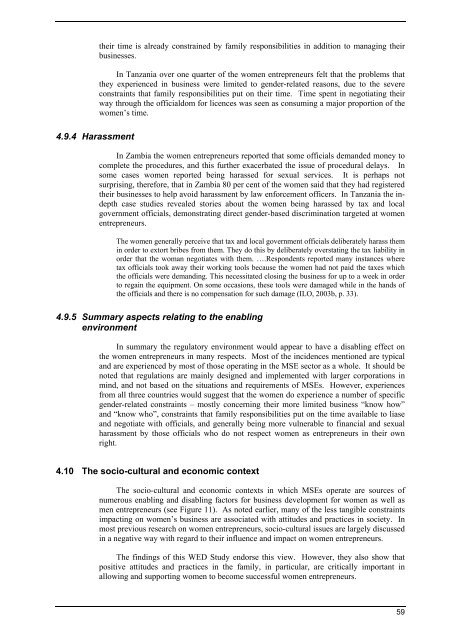The Challenges of Growing Small Businesses - International Labour ...
The Challenges of Growing Small Businesses - International Labour ...
The Challenges of Growing Small Businesses - International Labour ...
Create successful ePaper yourself
Turn your PDF publications into a flip-book with our unique Google optimized e-Paper software.
their time is already constrained by family responsibilities in addition to managing their<br />
businesses.<br />
In Tanzania over one quarter <strong>of</strong> the women entrepreneurs felt that the problems that<br />
they experienced in business were limited to gender-related reasons, due to the severe<br />
constraints that family responsibilities put on their time. Time spent in negotiating their<br />
way through the <strong>of</strong>ficialdom for licences was seen as consuming a major proportion <strong>of</strong> the<br />
women’s time.<br />
4.9.4 Harassment<br />
In Zambia the women entrepreneurs reported that some <strong>of</strong>ficials demanded money to<br />
complete the procedures, and this further exacerbated the issue <strong>of</strong> procedural delays. In<br />
some cases women reported being harassed for sexual services. It is perhaps not<br />
surprising, therefore, that in Zambia 80 per cent <strong>of</strong> the women said that they had registered<br />
their businesses to help avoid harassment by law enforcement <strong>of</strong>ficers. In Tanzania the indepth<br />
case studies revealed stories about the women being harassed by tax and local<br />
government <strong>of</strong>ficials, demonstrating direct gender-based discrimination targeted at women<br />
entrepreneurs.<br />
<strong>The</strong> women generally perceive that tax and local government <strong>of</strong>ficials deliberately harass them<br />
in order to extort bribes from them. <strong>The</strong>y do this by deliberately overstating the tax liability in<br />
order that the woman negotiates with them. ….Respondents reported many instances where<br />
tax <strong>of</strong>ficials took away their working tools because the women had not paid the taxes which<br />
the <strong>of</strong>ficials were demanding. This necessitated closing the business for up to a week in order<br />
to regain the equipment. On some occasions, these tools were damaged while in the hands <strong>of</strong><br />
the <strong>of</strong>ficials and there is no compensation for such damage (ILO, 2003b, p. 33).<br />
4.9.5 Summary aspects relating to the enabling<br />
environment<br />
In summary the regulatory environment would appear to have a disabling effect on<br />
the women entrepreneurs in many respects. Most <strong>of</strong> the incidences mentioned are typical<br />
and are experienced by most <strong>of</strong> those operating in the MSE sector as a whole. It should be<br />
noted that regulations are mainly designed and implemented with larger corporations in<br />
mind, and not based on the situations and requirements <strong>of</strong> MSEs. However, experiences<br />
from all three countries would suggest that the women do experience a number <strong>of</strong> specific<br />
gender-related constraints – mostly concerning their more limited business “know how”<br />
and “know who”, constraints that family responsibilities put on the time available to liase<br />
and negotiate with <strong>of</strong>ficials, and generally being more vulnerable to financial and sexual<br />
harassment by those <strong>of</strong>ficials who do not respect women as entrepreneurs in their own<br />
right.<br />
4.10 <strong>The</strong> socio-cultural and economic context<br />
<strong>The</strong> socio-cultural and economic contexts in which MSEs operate are sources <strong>of</strong><br />
numerous enabling and disabling factors for business development for women as well as<br />
men entrepreneurs (see Figure 11). As noted earlier, many <strong>of</strong> the less tangible constraints<br />
impacting on women’s business are associated with attitudes and practices in society. In<br />
most previous research on women entrepreneurs, socio-cultural issues are largely discussed<br />
in a negative way with regard to their influence and impact on women entrepreneurs.<br />
<strong>The</strong> findings <strong>of</strong> this WED Study endorse this view. However, they also show that<br />
positive attitudes and practices in the family, in particular, are critically important in<br />
allowing and supporting women to become successful women entrepreneurs.<br />
59
















